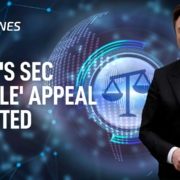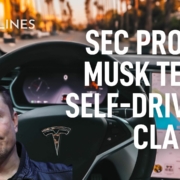Warren urges SEC to investigate Tesla over Twitter ties
Warren sends a letter to the U.S. Securities and Exchange Commission, urging them to investigate Tesla over possible conflicts of interest, misappropriation of corporate assets, and other negative impacts to Tesla shareholders related to Musk’s Twitter takeover. Warren says the Tesla board’s “apparent lack of independence” from Musk raises questions about possible violations of security laws and exchange rules which fall under SEC’s jurisdiction.
Musk’s SEC ‘muzzle’ appeal rejected
The 2nd U.S. Circuit Court of Appeals in Manhattan rejects Musk’s bid to modify or end his 2018 securities fraud settlement with the U.S. Securities and Exchange Commission that requires a Tesla lawyer to approve some of his tweets in advance. (SEC v Musk, 2nd U.S. Circuit Court of Appeals, No. 22-1291.). Musk argued that the SEC exploited his consent decree to conduct bad-faith, harassing investigations that violated his First Amendment free speech rights under the U.S. Constitution. His decree resolved an SEC lawsuit accusing him of defrauding investors with an Aug. 7, 2018, tweet that he had “funding secured” to take his electric car company private. (A San Francisco jury already found Musk not liable for investor losses over the tweet.)
In the appeal, Musk’s lawyers called the pre-approval mandate a “government-imposed muzzle” that amounted to an illegal prior restraint on his speech, but the court says the SEC had opened just two subsequent inquiries into Musk’s tweets, which “plausibly violated” the decree’s terms. The three-judge panel says that the SEC’s inquiries were “limited” and “appropriate,” and “have not made compliance with the consent decree ‘substantially more onerous'” for Musk, who chose to allow screening of his tweets and therefore has no right to revisit the matter “because he has now changed his mind.” Musk lawyer:
We will seek further review and continue to bring attention to the important issue of the government constraint on speech.
SEC probes Musk Tesla self-driving claims
US regulators are investigating Elon Musk’s role as part of an ongoing Securities and Exchange Commission probe of the company’s statements about its Autopilot driver-assistance system. SEC officials are weighing whether Musk may have inappropriately made forward-looking statements, although which statements have not been revealed.
An investigation by the agency’s enforcement unit doesn’t always lead to consequences, but can result in lawsuits, fines or other civil penalties for companies and executives.
Musk SEC letter confirming Twitter purchase released
Musk’s letter [link] to the SEC, confirming purchase of Twitter, is released. The purchase is conditional on debt financing and a stay of action of the Twitter-Musk court case.
Gentlemen: On behalf of X Holdings I, Inc., X Holdings II, Inc. and Elon R. Musk (the “Musk Parties”), we write to notify you that the Musk Parties intend to proceed to closing of the transaction contemplated by the April 25, 2022 Merger Agreement, on the terms and subject to the conditions set forth therein and pending receipt of the proceeds of the debt financing contemplated thereby, provided that the Delaware Chancery Court enter an immediate stay of the action, Twitter vs. Musk, et al. (C.A. No. 202-0613-KSJM) (the “Action”) and adjourn the trial and all other proceedings related thereto pending such closing or further order of the Court.
Musk files to end SEC ‘muzzle’
Musk asks for the term in his his 2018 consent decree with the SEC, that requires a company lawyer to pre-approve his Twitter communication, to be thrown out, arguing that it is “contrary to the American principles of free speech and open debate”.
The consent decree required Musk to step down as Tesla’s chairman; elect two new members to the company’s board; pay a $20 million penalty, plus a further $20 million form Tesla; establish a new committee of independent directors; and put in place additional controls and procedures to oversee Musk’s communications.
In April, after requesting the agreement be abolished, U.S. District Judge Lewis Liman refused to throw out the decree because Musk entered the terms of the decree “knowingly and willingly.” This time, Musk’s attorneys argue that the SEC’s review has become more invasive:
Under the shadow of the consent decree, the SEC has increasingly surveilled, policed, and attempted to curb Mr. Musk’s protected speech that does not touch upon the federal securities laws. Any objective served by the pre-approval provision has been served.




